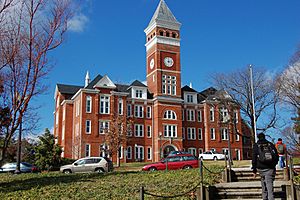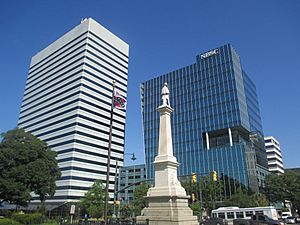South Carolina Heritage Act facts for kids
Quick facts for kids South Carolina Heritage Act |
|
|---|---|
 |
|
| South Carolina State Legislature | |
| Assembly voted | May 18, 2000 |
| Signed into law | May 23, 2000 |
| Sponsor(s) | Robert Ford |
| Governor | Jim Hodges |
| Code | S.C. Code Ann. Sec. 10-1-165 |
| Website | https://law.justia.com/codes/south-carolina/2012/title-10/chapter-1/section-10-1-165 |
|
Status: Current legislation
|
|
The South Carolina Heritage Act is a law in South Carolina. It stops people from moving or changing historic monuments on public land. It also prevents renaming public places or buildings that honor a historic person or event. This law protects many types of monuments. These include memorials for wars like the American Civil War and both World Wars. It also protects monuments about Native American and African American history.
When the Act became law in 2000, it was a way to find a middle ground. Some lawmakers wanted to remove the Confederate flag from the South Carolina State House. Others wanted it to stay. But the Act has caused many arguments in the state. It has stopped cities from removing memorials to people who are now seen as controversial. It has also stopped public universities from changing building names. This happened after the George Floyd protests.
A lawsuit questioned if the Heritage Act was fair and legal. The case went to the South Carolina Supreme Court on May 25, 2021. On September 23, the court said most of the law was legal. But they removed one part. This part said that two-thirds of lawmakers had to agree to change the law. The court said this rule limited the power of the state's lawmakers.
Contents
What the Heritage Act Says
The Heritage Act has clear rules about what cannot be changed. It protects monuments and memorials from many wars. These include the American Revolutionary War, War of 1812, Mexican War, War Between the States, Spanish-American War, World War I, World War II, Korean War, Vietnam War, and Persian Gulf War. It also protects monuments related to Native American and African-American History.
These monuments cannot be moved, taken away, or changed if they are on public land. Also, public places like streets, bridges, parks, or buildings cannot be renamed. This applies if they were named after a historic person or event. No one can stop the government from taking care of these monuments.
The law originally said that changing or ending the Act needed a special vote. Two-thirds of lawmakers in both parts of the General Assembly had to agree. However, the South Carolina Supreme Court later removed this two-thirds rule.
How the Act Became Law
The Heritage Act was signed into law on May 23, 2000. Governor Jim Hodges approved it. The law was a compromise to deal with the Confederate flag at the South Carolina State House. Some people wanted the flag removed, while others wanted it to stay.
The flag's placement on top of the State House was a big topic during the 2000 Republican Party presidential primaries. As part of the compromise, the flag was moved. On July 2, 2000, it was taken from the State House building. It was moved to a nearby Confederate Soldiers monument on the grounds. The flag was completely removed from the statehouse grounds in 2015. This happened after the Charleston church shooting.
Since it became law, the Heritage Act has caused many debates. In 2018, a court case in Greenwood County, South Carolina looked at a war memorial. This memorial listed soldiers by race. People wanted to change it. The court said the memorial could be changed. This was because a private group owned it, not the government. The court did not decide if the Act itself was legal.
The Act and Recent Protests

The Heritage Act became even more talked about after the George Floyd protests in 2020. During these protests, many people across the country asked for public memorials to be removed. They felt these monuments reminded them of unfair treatment of African Americans. In South Carolina, efforts to rename buildings or remove monuments have had different results:
- In June 2020, Clemson University's leaders wanted to rename Tillman Hall. This building was named after Ben Tillman. He helped create the university but was also a white supremacist. The university asked lawmakers to change the Heritage Act so they could rename the building. On June 12, 2020, the university did remove John C. Calhoun's name from its Honors College.
- The University of South Carolina also asked lawmakers for permission to rename the J. Marion Sims residence hall. The university looked at renaming other buildings, like the Strom Thurmond Fitness Center. But any name change would need the Heritage Act to be changed first. The university decided not to push for renaming these buildings because of the Act.
- In June 2020, the state's Attorney General, Alan Wilson, gave an opinion. He said the Heritage Act did not apply to the removal of the John C. Calhoun Monument in Charleston. He stated that Calhoun did not fit the Act's rules. Also, the monument was on private land.
- Alan Wilson's office also said the Meriwether Monument in North Augusta was not covered by the Heritage Act. This monument honored one white man killed during the Hamburg massacre. It did not mention the six Black men who were killed by that man's group. However, lawmakers still need to approve the monument's removal. This is because the General Assembly put it there in the first place.
South Carolina Supreme Court Decision
In July 2020, a lawsuit was filed against the Heritage Act. Jennifer Pinckney (the wife of Clementa C. Pinckney), Columbia City Councilmember Howard Duvall, and former state Senator Kay Patterson filed the case. They argued that the Act's rule requiring two-thirds of votes to change it was unfair. They also said the law went against local control.
The South Carolina Supreme Court heard the arguments on May 25, 2021. The court looked at several main questions. They considered if the case was ready to be heard. They also looked at whether the two-thirds vote rule was legal. They also thought about if that rule could be separated from the rest of the law. Finally, they considered if the list of protected monuments was too specific.
On September 23, the court decided that most of the Act was legal. But they removed the rule that needed two-thirds of lawmakers to vote for changes. The court said this rule limited the power of the General Assembly to make laws.
 | Misty Copeland |
 | Raven Wilkinson |
 | Debra Austin |
 | Aesha Ash |


